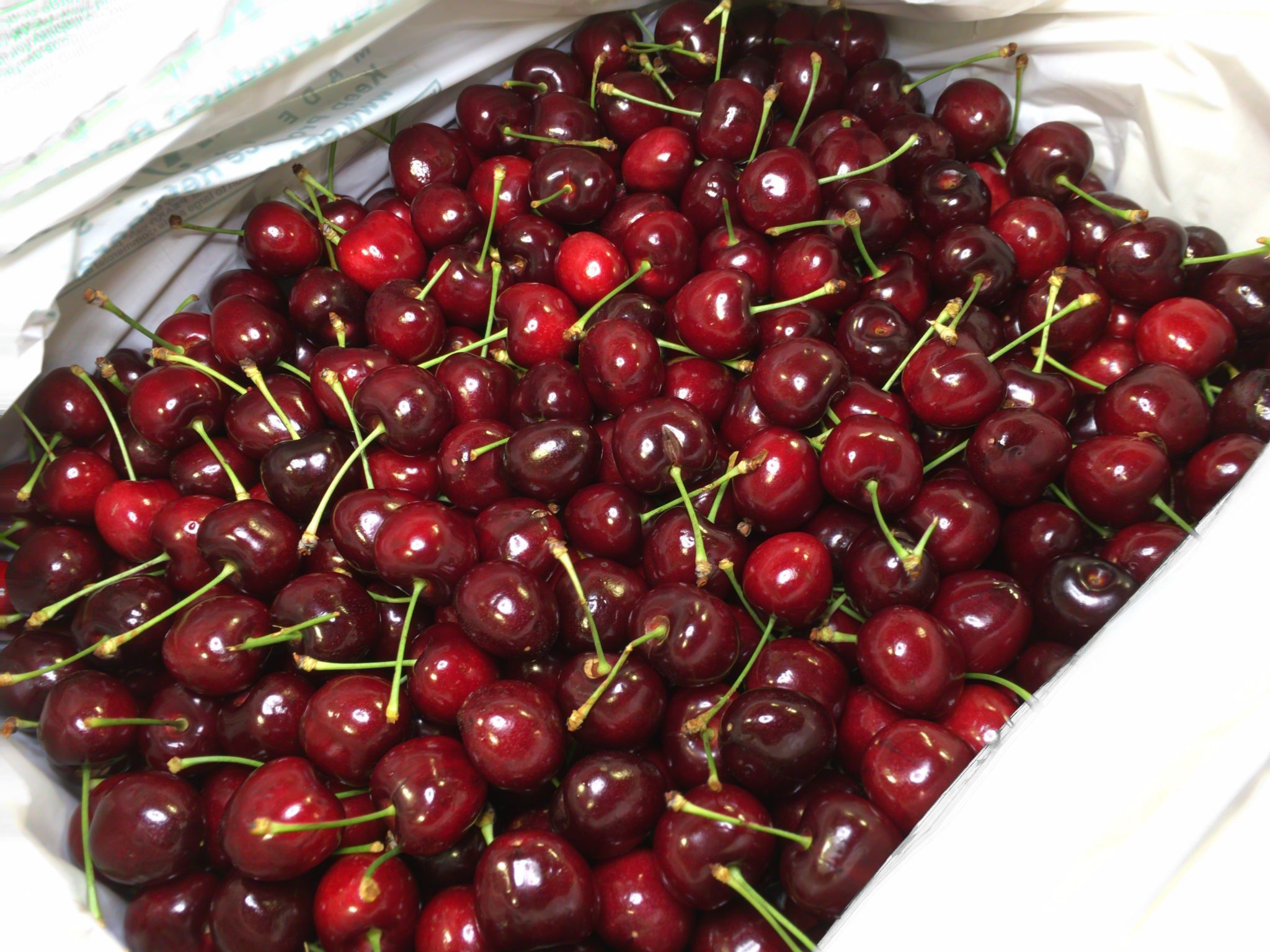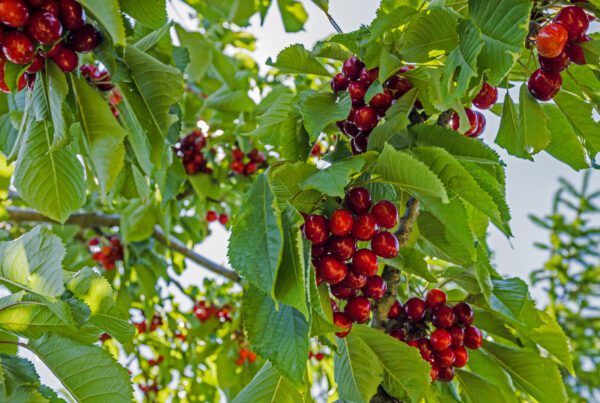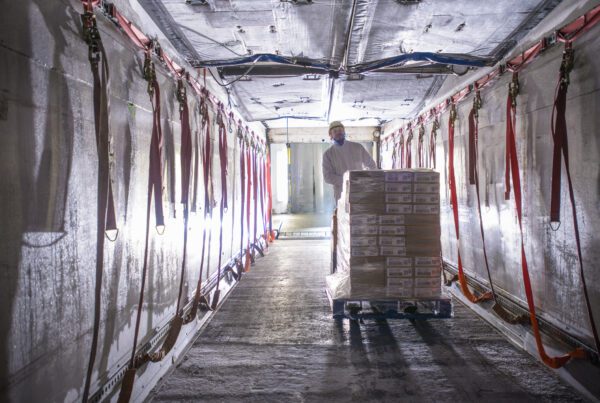The first fruit to fall: Washington cherries are early casualties of Trump’s trade war

Photo Credit – ANTHONY BOLANTE | PSBJ
Seconds count in Don Ehrlich’s business. Ehrlich is a travel agent for perishable freight, and there’s no busier time than cherry season. He only has about 12 hours to get millions of cherries from processors to planes. Few fruits are pickier travelers than Washington cherries, which spoil quickly and are very sensitive to temperature.
But lately, Ehrlich’s job has changed. He’s been splitting up shipments to lessen the chance his clients’ cherries will be quarantined under a new Chinese policy. It’s just one of the changes China has made in retaliation for tariffs President Donald Trump imposed on Chinese goods. Another is a series of tariffs that have converted Washington cherries from a seasonal snack to a super-luxury product in Chinese supermarkets, where they now sell for $10 per pound.
China now has a 50 percent tariff on Washington cherries, apples and other agricultural products, up from just 10 percent in March. Mexico — the No. 1 market for Washington apples — imposed a 20 percent tariff on U.S. apples last month. When Mexico imposed a similar tariff in 2010, it cost Washington growers $44 billion, according to the Northwest Horticultural Council. Cherry shipments are already down significantly, and experts expect them to drop even more as the season continues.
Washington’s 1,400 cherry growers and 3,000 apple growers aren’t the only businesses taking a hit. The supply chain for fresh fruits and other Washington exports targeted by tariffs touches thousands of jobs throughout the state, from truckers to port workers, and is responsible for billions of dollars in economic activity. At least 1.2 million Washington jobs are tied to trade, an analysis of employment data shows. Major trade partners including China, Mexico, Canada and the European Union have slapped tariffs on more than $7.1 billion worth of Washington exports from almonds to aluminum.
The rest of the state’s $76.4 billion in exports could be on the line as the Trump administration continues to expand penalties on imports to the U.S. Slow food “Fruit is moving, but it’s slower than it should be,” Ehrlich said. “The product is suffering because of a delay in distribution on the China side.” That delay can be a day or many days, he said. If a shipment is selected for quarantine, the cherries may lack proper refrigeration and will quickly spoil. The constantly changing market price also means they could be worth less than when they arrived. That’s what happened to one of Ehrlich’s shipments of Washington cherries, which weigh as much as 9,000 pounds and sat in Shanghai for two days.
Experts expect these delays are just the start, and portend more pain ahead for growers, shippers and the thousands of people whose jobs rely on the export of Washington-made products. Cherries start their journey to China by going from the grower’s orchard to a processor, and then traveling on trucks to Seattle-Tacoma International Airport. They’re loaded onto cargo jets that fly directly to China. That process is coordinated by companies like Ehrlich’s Commodity Forwarders.
Nearly 88,000 metric tons of exports passed through Sea-Tac Airport in 2017. More than a quarter of those goods — nearly 25,000 metric tons — were cherries, worth about $143.7 million. Sea-Tac has nearly three times as many freighters during cherry season. Asiana and China Cargo, for example, each add six flights per week during Washington’s cherry season. Cherry shipments and air cargo traffic to Asia are down since China imposed the new tariffs. Cherry season — which typically runs from June 15 to Aug. 15 — is about halfway over and cherry shipments are soft, Washington State Fruit Commission President B.J. Thurlby said. The state has shipped around 800,000 boxes so far this year, compared with 1.5 million at the same time last year. There’s also a smaller crop this year because of high temperatures, he said, so it’s hard to know how much of the drop is due to the tariffs.
That said, Thurlby is watching the Chinese market closely. “If we keep losing markets like China, we’re going to be in deep trouble,” he said. Sea-Tac traffic for Asia-destined cargo carriers dropped 5 percent in June and is down 18 percent so far this month, said Ken Galka, the Port of Seattle’s air cargo operations manager. The port expects a 30 percent decrease in freighter flights to Asia for the full month of July compared to last year. It’s not possible to tell how much of the drop is due to the tariffs or the year’s smaller crop, Galka said. While the three mainland Chinese carriers operating through Sea-Tac have not canceled flights so far, airport officials say they aren’t seeing the same summer peak they saw last year. One Asian carrier’s Seattle-based outpost, however, has decided to de-emphasize shipments to China and divert operations to Southeast Asia in response to the tariffs, Galka said.
Fast resolution wanted Washington’s agriculture industry is banking on a quick resolution to the tariffs. China is a key customer of Washington state cherries, said Thomas Riggan, CEO of Chelan Fresh, one of Washington State’s largest fruit exporters. The company is owned by nearly 400 growers and has about 8,000 employees. When the flow of cherries to a big market like that is suddenly reduced, it puts more pressure on the domestic market, Riggan said, and that pushes down prices. “Our only hope that things get resolved,” he said. He remains confident they will. Chelan Fresh will have to “shrink back,” Riggan said, if the trade war persists.
Kate Woods, vice president of the Northwest Horticultural Council, which represents growers, packers and shippers in Washington, Oregon and Idaho, said cherries are still being shipped to China but the tariffs are beginning to reduce prices back home. “Growers are going to see less money in their pockets,” she said. “If these tariffs are still in place come the next harvest, it’s going to be a hard sell into that market.” Once prices rise, Chinese vendors are likely to seek less expensive sources of fresh fruit. Growers in China are already expanding greenhouse production of cherries, according to the U.S. Department of Agriculture. Apples, which are grown all over the world, are even easier to procure. Even if the tariffs go away, growers in the state will have a harder time exporting their fruit, Port of Seattle Commission President Courtney Gregoire said.
“Agriculture producers fought so hard to gain market access,” she said. “Once that door closes, it’s really hard to open it again.” More to come Agricultural imports could be just the beginning, said Robert Hamilton, Washington Gov. Jay Inslee’s trade policy adviser. The Trump administration is considering new tariffs on automobile imports. Auto companies with Seattle operations have already voiced concerns about the potential damage to their businesses if those tariffs are enacted, but the effects would be felt far beyond the auto industry if countries decide to retaliate. Most of the new tariffs on U.S. imports are in response to U.S. tariffs on steel and aluminum. Those tariffs target around $40 billion worth of aluminum and steel, about four and a half times less than the $176 billion in automobile imports in 2017.
“The possible retaliation,” Hamilton said, “is easily three times the size.” The cherry trade China’s tariffs on U.S.-originated cherries grew from 10 percent to 50 percent in a matter of months. As recently as March, Washington cherry importers were charged a 10 percent tariff to bring the fruit to China. China imposed in April an additional 15 percent tariff on 120 U.S. imports including nuts, fruits and cherries. Then, after the U.S. targeted China with new tariffs related to intellectual property concerns on July 6, China responded with an additional 25 percent tariff on 545 U.S. imports, including cherries.
Article courtesy of Ashley Stewart, Staff Writer, Puget Sound Business Journal



